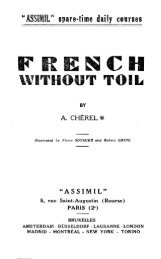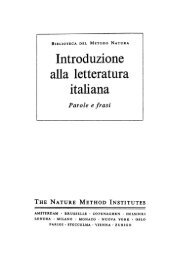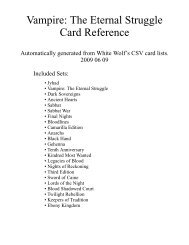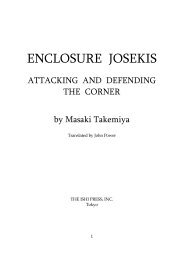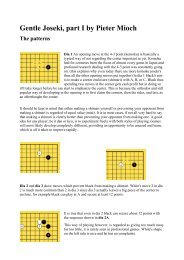Plains Cree: A Grammatical Study - Computer Science Club
Plains Cree: A Grammatical Study - Computer Science Club
Plains Cree: A Grammatical Study - Computer Science Club
You also want an ePaper? Increase the reach of your titles
YUMPU automatically turns print PDFs into web optimized ePapers that Google loves.
32 WOLFART: PLAINS CREE<br />
[TRANS. AMER. PHIL. SOC.<br />
contraction cf. appendix A: 4.2). Nouns in /enaw/<br />
are derived from inanimate intransitive (II) verbs in<br />
/ena/, with their most common inflected forms being<br />
homonymous; e.g., ispatinaw II 0 'it is a hill,' or the<br />
noun 'hill.' Since these nouns and verbs typically<br />
denote topographical features, the semantic connection<br />
with the /enahk/ suffix is obvious. However, none<br />
of the nouns which take /enahk/ as a distributive<br />
locative suffix are actually paralleled by a verb in<br />
/ena/ (although a form like mostosondw 'it is buffalo<br />
country' might well be expected). Thus, while the<br />
/enahk/ forms must ultimately be regarded as derived<br />
nouns, for all practical purposes /enahk/ functions<br />
as a somewhat restricted inflectional suffix.<br />
3.7. VOCATIVE<br />
The vocative singular is formed in a variety of<br />
ways while /etik/ is uniformly used for the plural.<br />
3.71. Singular<br />
Normally no special ending is used for the vocative<br />
singular, e.g., T7p5, 20 nitokimam 'oh my king.'<br />
However, most of the kin terms and a few nouns of<br />
intimate possession have vocative forms which are<br />
still largely used; the younger generation uses these<br />
in free variation with the simple proximate singular<br />
form (not the stem; but cf. Lacombe, 1874b: p. 6).<br />
The vocative singular frequently ends in a long<br />
vowel; this fact may well be related to phenomena<br />
of rhetorical distortion. While some kin terms remain<br />
unaffected, others undergo apocope (the loss of final<br />
consonants, vowel-consonant, sequences, or whole<br />
syllables) or add a suffix -e; vowels are often length-<br />
ened or distorted. The following lists are by no<br />
means exhaustive; the glosses are incomplete.<br />
Apocope:<br />
nohtawiy 'my father' nohtd<br />
nikdwiy 'my mother' nekd<br />
nimosom 'my grandfather'<br />
nimoso<br />
nohkom 'my grandmother'<br />
nohko<br />
nitihkwatim 'my cross-nephew,<br />
son-in-law'<br />
nitehkwd<br />
nitawemaw 'my cross-sibling' nitawemd<br />
nitdnis 'my daughter'<br />
nitan<br />
niciwdm 'my male parallel cousin' niciwa<br />
nikwemes 'my namesake, friend'<br />
Suffix -e:<br />
nikweme<br />
nimis 'my elder sister' nimise<br />
nisikos 'my father's sister,<br />
mother-in-law'<br />
nisikose<br />
nisis 'my mother's brother,<br />
nisise<br />
father-in-law'<br />
nisim 'my younger brother' nisime<br />
nistes 'my older brother' nistese<br />
nicdhkos 'my (f) sister-in-law' nicahkose<br />
Apocope and suffix -e:<br />
nikosis 'my son'<br />
nosisim 'my grandchild'<br />
nikose<br />
nosise<br />
Vocative identical to proximate singular:<br />
nipdpa 'my father'<br />
nimamd 'my mother'<br />
niscds 'my male cross-cousin'<br />
nitotem 'my fellow tribesman'<br />
3.72. Plural<br />
The vocative plural is always formed with /etik/:<br />
nisim 'my younger brother'<br />
nitoskinikim 'my young man,<br />
crew member'<br />
dtayohkan 'spirit guardian'<br />
3.8. "QUASI-NOUNS"<br />
nislmitik<br />
nitoskinikimitik<br />
dtayohkanitik<br />
Some otherwise non-paradigmatic forms, i.e.<br />
particles, take the vocative plural (3.72) and simple<br />
locative (3.61) suffixes and, in a few cases, even the<br />
plural marker /k/ (3.31, 5.481). Syntactically, these<br />
are predicative particles but because they make use of<br />
nominal suffixes they are, for the nonce, called<br />
QUASI-NOUNS.<br />
3.81. Locative<br />
The locative suffix /ehk/ occurs freely but not<br />
very frequently, e.g., dstam 'here, come here': dstamihk<br />
'on this side.' The same meaning is usually expressed<br />
by the locative morpheme ita (which also occurs as a<br />
particle by itself), e.g., dstamita 'on this side, closer.'<br />
3.82. Vocative<br />
More typical and more frequent are particles which<br />
take the vocative plural suffix /etik/.<br />
Extremely frequent are dstam 'come here,' awas 'go<br />
away'; when more than one person is addressed, we<br />
find dstamitik, awasitik.<br />
A less common example is the particle mdcikotitdn,<br />
mdcikocicdn 'look, let me show you' whose internal<br />
structure is obscure. Although a "plural" form<br />
mdcikotitak does occur in Bloomfield's texts, mdciko-<br />
titan may be addressed to one or several persons. In<br />
the narrow use, when only one person is addressed,<br />
our texts oppose mdcikocicdn to a "vocative plural"<br />
mdcikocicdnitik.<br />
A more problematic form is ekotik 'let's go'<br />
(T523p86) which seems to be based on the pronominal<br />
stem eyakw--e-kw- (4.41).<br />
3.83. Plural<br />
A few particles have forms with and without final<br />
/k/. Whatever the etymological origin of the /k/,<br />
the forms with /k/ seem to be interpretable as plural:<br />
S326-3 "niya, nisim, sipwehte!" 'Go, little sister,<br />
depart! (AI 2)'. S69-23 "niyak! mdcik!" 'be off,<br />
hunt! (AI 2p).'



